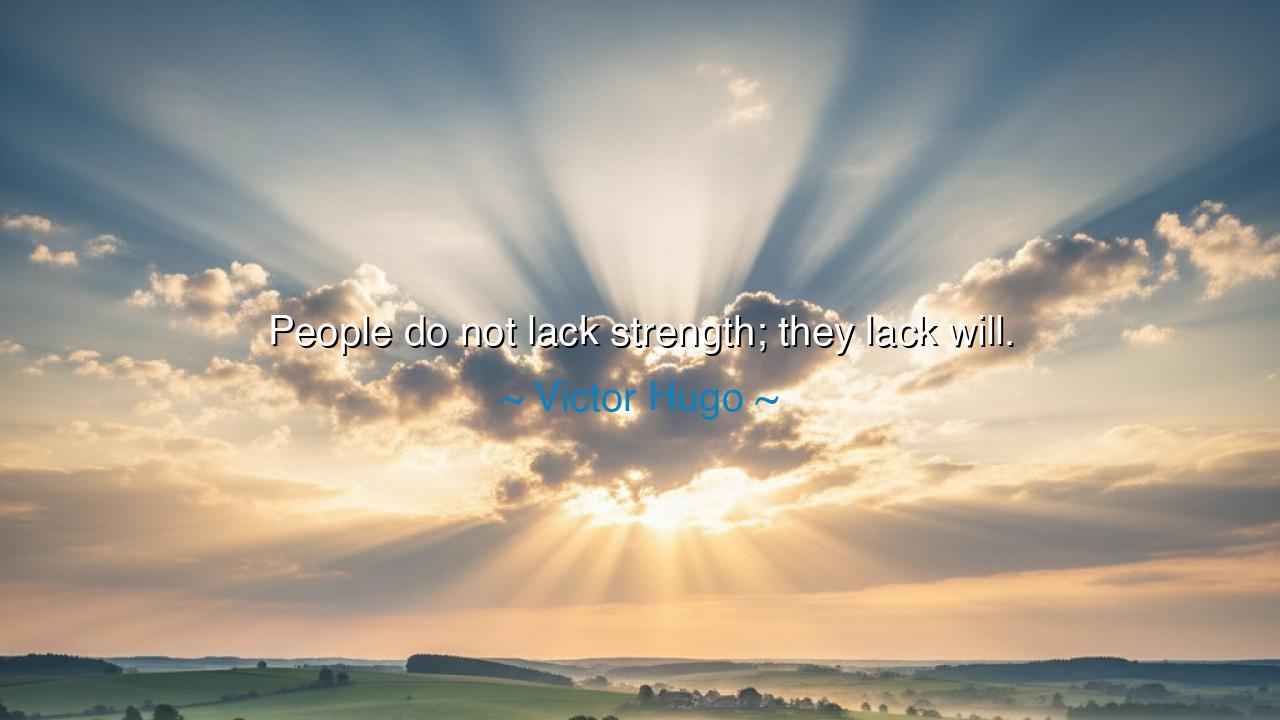
People do not lack strength; they lack will.






Victor Hugo’s words, “People do not lack strength; they lack will,” thunder with the conviction of one who had gazed deeply into the heart of human struggle. He draws a sharp distinction between the body and the spirit, between capacity and resolve. For Hugo, men and women are endowed with more than enough potential to endure, to fight, to rise—but too often they falter, not because they are too weak, but because they refuse to summon the will that turns strength into action.
The origin of this insight lies in Hugo’s life and times. Living in nineteenth-century France, Hugo was not only a poet and novelist but also a political figure, exiled for his defiance of tyranny. He witnessed revolutions, oppression, and the ceaseless struggle of common people against hardship. His works—Les Misérables, The Hunchback of Notre-Dame—are filled with characters who reveal the tension between weakness and resolve. In his view, the great tragedies of humanity often came not from a lack of resources, but from a lack of courage, from the failure to act when action was required.
History gives us clear evidence of this truth. Think of Winston Churchill during the darkest days of World War II. Britain stood alone against the Nazi war machine, resources scarce, exhaustion heavy. Yet Churchill declared that they would never surrender, that they would fight on the beaches, in the streets, in the fields. The physical strength of the British was strained, but it was their will that held firm. That willpower turned the tide, inspiring allies and ensuring that darkness did not triumph.
Likewise, in the life of Mahatma Gandhi, we see this principle embodied in quiet endurance. He did not raise armies or wield weapons, yet he led a nation to freedom through the will to resist oppression peacefully. The strength of his body was modest, but the strength of his spirit was immense. His life proved that human transformation depends not on physical might, but on the determination to pursue justice even in the face of suffering.
Hugo’s teaching also speaks to the battles within. Many individuals face trials—addiction, despair, doubt—and believe themselves too weak to overcome. Yet the true deficit is often not of strength, but of will: the decision to rise again, to keep striving, to refuse to surrender. Once the will is engaged, people discover reservoirs of strength they never knew they possessed. The body bends to the command of the spirit; the outer life reflects the fire of the inner.
For those who hear this teaching, the lesson is clear: do not excuse inaction by claiming weakness. Look first to your will, for it is the master of your strength. Ask yourself: is it truly your muscles, your mind, your resources that fail you? Or is it your courage to act? Once the will is awakened, strength follows like a faithful servant.
The practical path is this: cultivate your will daily. Begin with small disciplines—rising early, keeping promises, enduring discomfort. Train your spirit as one trains the body, so that when the great challenges come, your will is already strong. Trust that your strength is enough, if only you will summon it.
Thus, Hugo’s words stand as a trumpet call across the centuries: mankind is not undone by weakness of body, but by surrender of heart. The strength lies within us, but it is the will that must awaken it. To the one who wills, no mountain is too high, no darkness too deep, no chain unbreakable.






AAdministratorAdministrator
Welcome, honored guests. Please leave a comment, we will respond soon